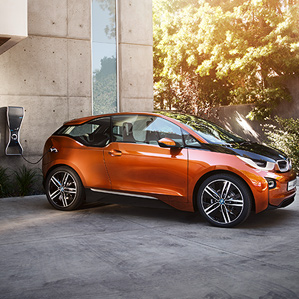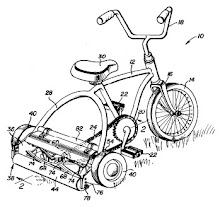If battery technology continues its slow development, will a different ownership model be the accelerator that electric vehicles need to break through? Our approach to personal transport is dominated by two models, with BMW pointing the way to an exciting hybrid approach:
| Own | 1900-present |
|
|---|---|---|
| Sharing | 2000-present |
|
| Hybrid | ??? |
|
 EV advocates have been claiming since the 90s that a 120-mile range is enough to handle the typical American commute and errand schedule between recharges. This analysis neglects the fact that we don't buy our cars to handle the 90% most frequent use cases. If that were true, we'd see entire fleets of single-seat cars with no trunk space. At our most rational, we buy our cars to handle 95-99% of the functionality we need so that even single people can drive friends around, take the occasional road trip, and bring home an umlauted cabinet from IKEA. Our desire for functionality can even be aspirational, with few people ever realistically intending to drive their SUV off-road or push their Mustang's cornering and acceleration limits. It's not enough to just handle the commute, and the technical responses (better batteries, on-board charging, battery swapping) have yet to demonstrate practicality. BMW has figured out a clever service-based model that addresses the other 5-10% of the user's mobility needs.
EV advocates have been claiming since the 90s that a 120-mile range is enough to handle the typical American commute and errand schedule between recharges. This analysis neglects the fact that we don't buy our cars to handle the 90% most frequent use cases. If that were true, we'd see entire fleets of single-seat cars with no trunk space. At our most rational, we buy our cars to handle 95-99% of the functionality we need so that even single people can drive friends around, take the occasional road trip, and bring home an umlauted cabinet from IKEA. Our desire for functionality can even be aspirational, with few people ever realistically intending to drive their SUV off-road or push their Mustang's cornering and acceleration limits. It's not enough to just handle the commute, and the technical responses (better batteries, on-board charging, battery swapping) have yet to demonstrate practicality. BMW has figured out a clever service-based model that addresses the other 5-10% of the user's mobility needs.
You don't want a drill, you want a hole. You don't want a car, you want mobility.
This hybrid model is an effective one that could carry us for the next 10-15 years. With the advent of driverless cars, I would expect that the pure service-based model will become more popular. Not piloting one's own car reduces personal investment in that particular metal box. If a shared car can drive itself from the remote garaging location, it removes one of the disadvantages of a sharing model. Driverless cars may make personal car ownership seem pointless. Given the surprising development speed of robot cars and the frustrating state of battery technology, does anyone want to take any bets on which one hits 10% penetration first?

